General Motors CEO Mary T Barra believed that in the corporate world, the worm has a better view than the bird. In this unflattering example, the bird is the CEO and the worm is the low-level employee. Barra explains it better:
“Some people are natural-born leaders. Some can be great leaders with the right training. Some are better as individual contributors. Looking at them from above, it’s very hard to tell who fits in what category. But the people who work for them can tell you.”
Employees who start at ground level have a unique perspective that often goes undervalued. As middle and upper management staff are often brought in at higher levels rather than having to climb, only a select few CEOs have this experience.
At 18 years old, Mary Barra got into the muck at GM by inspecting hoods and fender panels. Over the next few decades, she rose up the ranks, eventually hitting titles like senior vice president of global product development.
Barra says that “having been a plant manager, having been responsible for product development, having understood HR…” equipped her with the skills she needed to run the company. Much better than a leadership and management manual.
When management begins at the top, there’s a disconnect between lower-level staff. To combat this, should all corporate employees start from the bottom?
Ground zero
CEOs drive growth. With this laser focus, and so much big picture responsibility, it’s easy to lose sight of those you steer the ship: your staff. Even humble founders quickly delegate out the day-to-day and suffer a disconnect from their lower-level employees.
But when CEOs start at the bottom, they empathise with their subordinates and know valuable feedback when they hear it.
John Deere CEO Samuel Allen started off as an industrial engineer: “I spent part of my career in construction and forestry… the diversity of exposure and experiences has been really good from a professional standpoint”.
While it isn’t necessary for CEOs to start from the bottom, it helps.
It boosts employee respect, company morale, and your likelihood of understanding your customer via the people who speak to them every day. In the words of Johnsons & Johnson CEO Alex Gorsky: “One minute of your time matters. Spend time speaking to all levels of your organisation to get a pulse on what’s happening. Ask those who work for you: what are you working on? What are you worried about?”
Taco Bell devised a unique strategy to combat this disconnect by making all corporate employees work restaurant shifts for at least a week. CEO Mark King food prepped, bag stuffed, and cleaned at a California store under the eye of a regional supervisor when he onboarded as CEO.
Air NZ CEO Greg Foran is often found “working with our Cabin Crew serving on flights, checking customers in at airports, or welcoming everyone arriving or departing at Koru lounges.”
It reduces barriers between crew and corporate. And it makes essential considerations – menu items, point-of-sale displays, customer experience – much more tangible when decisions are being made back in the boardroom.
Perhaps the most radical impact of CBS’s actual Undercover Boss shows is the unfiltered feedback CEOs often get from low-level employees, like when one unknowingly told undercover Clean Harbors CEO Alan McKim that he sat in a glass house and “didn’t really care”.
There’s a natural scepticism with these shows and the puff pieces that follow – anything made for TV can be engineered to an extent. But the lesson remains true: sometimes what people would never say to our faces is exactly what we need to hear.
Founders undercover
Starting from the bottom isn’t for everyone. CEOs are often CEOs for the exact reason of being big picture thinkers. Poor attention to detail, big personalities, or impatience with repetition can make natural leaders terrible low-level employees.
But at small startups and scaleups, it makes sense to don the uniform once in a while. Even one week a year can provide a serious reality check on how things have moved on since you moved up.
You can pinpoint errors in management or optimise employee workflows. You’ll be able to see the whole sales funnel or customer decision making process. And you will likely claw your way out of a lot of cognitive biases that tell you you know best.
It’s also industry dependent. Non-technical founders don’t need to know code. Store founders don’t need to have customer service skills.
And ultimately, there’s such a thing as too much time on the ground. A founder’s job is focusing on growth, and effective delegation.
Offing middle management
Remote work has shone an uncomfortable spotlight on the redundancy of whip-crackers. Their case isn’t helped by the AI and automation quickly replacing them. Digital infrastructure is replacing the physical office, and along with it the ability to hover at shoulders.
But synergized (or to sound less corporate, connected) teams and people are still the building blocks of any company. Where middle managers have historically focused on KPIs and cultivating competition, they now have an opportunity to focus on reconnecting people across home and hybrid formats (and save their jobs in the meantime).
With all the time and productivity saved by reduced commutes, better energy levels, and more empowered staff, middle managers can find ways to nourish, nurture, and maybe even get stuck in once in a while. That’s as long as they don’t fall into the Dunning-Kruger trap of thinking they’re too good for it.











